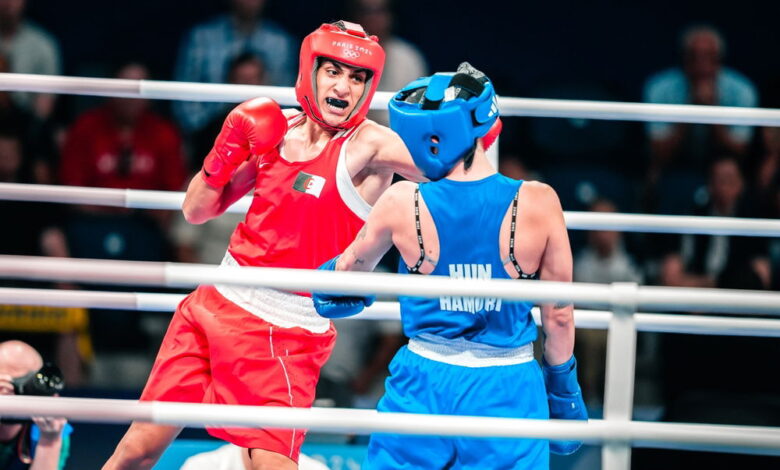Imane Khelif banned World Boxing Championships « Euro Weekly News


Imane Khelif of Team Algeria and Anna Luco Hamori of Team Hungary during the Women’s 66kg quarterfinal match on seventh day of the Olympic Games Paris.
Credit: Shutterstock, ProPhoto1234
Argelia’s Olympic boxing champion Imane Khelif has been given the boot over her ongoing ‘XY chromosomes’ row.
They say lightning never strikes twice – well, try telling that to controversial ‘intersex’ boxing champion Imane Khelif! The Argelian boxer, who landed Olympic gold in Paris – despite widespread claims of having male XY chromosomes – has been slapped with a monumental ban just weeks before the Women’s World Championship in Serbia. Talk about punching below the belt…
Just seven months ago, Khelif exploded onto the scene at the Paris Olympics, pummelling her female opponents into oblivion in record time. Critics were quick to point out her ‘huge physical advantage,’ which some chalked up to her XY genetic makeup. But officials let her box as a ‘woman’ anyway – sparking one of the biggest scandals in recent Olympic memory.
IBA state Imane Khelif ineligible for Women’s World Boxing Championships
She thumped and battered her way to the gold medal, leaving bruised and tearful female boxers in her wake, and baffling fans in the process. The Olympic Committee refused to admit responsibility and fought tooth and nail to keep the boxer competing in the Olympics. But as the dust settled, the International Boxing Association (IBA) began sharpening its rulebook.
Now, with the Women’s World Championships just around the corner (March 8–16 in Belgrade), they’ve delivered a knockout blow to Khelif’s dreams of stepping back into the ring with female boxers. In a swift turn of events, the IBA has declared the Argelian champ ineligible to compete, citing her ‘gender’ as grounds for refusal.
IBA decision seen as violation of Imane Khelif’s human rights
Adding insult to injury, the Association claims Khelif also failed a test in 2023 – another uppercut for the beleaguered boxer. The official line? Their technical rules ‘clearly stipulate the requirements and eligibility criteria for the event,’ which she apparently does not meet.
Unsurprisingly, the IBA’s decision has whipped up a storm of controversy. Athletes, fans, and human rights organisations are crying foul over what they see as a lack of transparency and fairness. Some argue that Imane Khelif’s fundamental human rights are being violated, as she was raised as a female. This, they argue, gives her the right to step into the ring with females.
The great chromosome conundrum: Is it enough to disqualify Imane Khelif as a ‘female’?
As previously reported by the BBC, according to experts like Dr Emma Hilton – a developmental biologist – sex isn’t always simply XX or XY. Differences in Sex Development (DSDs) can scramble genetics, hormones, or anatomy. While the SRY gene typically directs male development, it doesn’t always function predictably. A mere Y chromosome test doesn’t always confirm sex, making these issues especially complex for high-stakes competitions.
Some DSD conditions involve individuals with XY chromosomes and internal testicles, rather than ovaries. These testicles can produce testosterone, potentially giving a huge physical advantage – greater muscle mass, bone density, and endurance. Many argue that possessing functional male gonads and XY chromosomes typically disqualifies someone from being categorised as ‘female’ for sporting purposes.
Is stigma to blame for Imane Khelif ongoing debate?
One reason for the murkiness is stigma: in some cultures, discussing female anatomy or absent periods is taboo. Many people with DSDs go undiagnosed for years, even decades. Professor Claus Højbjerg Gravholt, an endocrinologist from Aarhus University, experienced patients who only learnt they had XY chromosomes or unusual hormone profiles when they found they couldn’t conceive – or never menstruate.
The trouble is, thorough responsible testing is pricy, complicated, and – let’s face it -very intrusive. We’re talking intimate measurements that can leave athletes feeling humiliated and empath warriors screaming for people’s heads on the streets. Then there’s the ethical minefield of forcing private medical data into the public domain of course.
The IOC stands by its ‘assumption of no advantage’ for athletes with unconfirmed DSD – though many scientists say there’s scant evidence to back that stance. Experts like Dr Shane Heffernan – who studies molecular genetics in elite sports – argue that what’s needed is real research and real tests, not assumptions and politics.
Read more news in English from around sports.
Get more news about living in Spain today.




